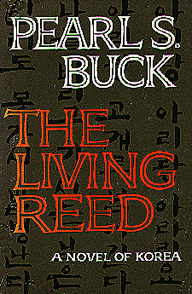GOLDSEA | ASIAN BOOKVIEW | FICTION
The Living Reedby Pearl S. Buck
John Day Company, New York, 1963, 478 pp, $22.95
A sweeping romantic saga that follows the fortunes of three Korean brothers during the dark half century of their nation's history beginning with the murder of Queen Min.
EXCERPT
 he year was 4214 after Tangun of Korea, and 1881 after Jesus of Judea. It
was spring in the capital city of Seoul, a good season for a child to be born,
and a fair day. Il-han, surnamed Kim, of the clan of Andong, sat in his
library waiting for the birth of his second child to be announced. It was a
pleasant room, larger than most rooms, and since the house faced south, the
sun climbing over the walls of the compound shone dimly through the
rice-papered lattices of the sliding walls. He sat on satin-covered floor
cushions beside a low desk, but the floor itself was warmed by smoke ducts
from the kitchen stove, after the ancient ondul fashion. He tried
diligently to keep his mind on his book, open before him on the low desk.
Three hours had passed since his wife had retired to her bedroom,
accompanied by her sister, the midwife and women servants. Three times
one of the other of them had come to tell him that all went well, that his
wife sent him greetings and begged him to take nourishment, for the birth
was still far off.
he year was 4214 after Tangun of Korea, and 1881 after Jesus of Judea. It
was spring in the capital city of Seoul, a good season for a child to be born,
and a fair day. Il-han, surnamed Kim, of the clan of Andong, sat in his
library waiting for the birth of his second child to be announced. It was a
pleasant room, larger than most rooms, and since the house faced south, the
sun climbing over the walls of the compound shone dimly through the
rice-papered lattices of the sliding walls. He sat on satin-covered floor
cushions beside a low desk, but the floor itself was warmed by smoke ducts
from the kitchen stove, after the ancient ondul fashion. He tried
diligently to keep his mind on his book, open before him on the low desk.
Three hours had passed since his wife had retired to her bedroom,
accompanied by her sister, the midwife and women servants. Three times
one of the other of them had come to tell him that all went well, that his
wife sent him greetings and begged him to take nourishment, for the birth
was still far off.
"Far off," he demanded. "How far off?"
Each time the answer had been a shake of the head, a vague smile, a retreat,
bahavior typical of women, he thought somewhat scornfully, at least of
Korean women, silken sweet on the surface, but rock stubborn underneath.
All except his beautiful and beloved wife, his Sunia! He would have been
ashamed to show to anyone, even to her, how much he loved her, and this
although he had never seen her before their wedding. For once
matchmakers had not lied and fortunetellers had been correct in the
forecasting of signs and dates. Sunia had fulfilled every duty as a bride. She
had not smiled once throughout the long day of the wedding, in spite of the
ruthless teasing of relatives and friends. A bride who could not control
her laughter on her wedding day, it was said, would give birth only to girls.
Sunia had given birth to a son, now three years old, and if the foretuneteller
was right again, today she would have another. Il-han's home, his family,
made a center of peace in these troubled times of his country. But when had
times not been troubled for Korea? In four thousand years there had been
scarecely a century of peace for the small valuable peninsula hanging like a
golden fruit before the longing eyes of the surrounding nations, proud China
demanding tribute, vast Russia hungry for the seacoast she did not have and
Japan, ambitious for empire.

He sighed, forgetting home and family, and rose to walk impatiently to and fro across the room. It was impossible to keep his mind fixed on books, although he was a scholar, not the scholar his father was, poring over ancient volumes, but a scholar for all of that. His book today was a modern one, a history of western nations. His father would not have been pleased had he known that he, Kim Il-han, the only son of the Kim family of Andong, was engaged in such learning, his father who lived in the classics of Confucius and in dreams of the golden age of the dynasty of Silla! But he, Il-han, like all young men of his generation, was impateitn with old philosophies and religions. Confucianism, borrowed from China, had isolated this nation already isolated by sea and mountain, and Buddhism had lef the hermit mind of his people into fantasies of heaven and hell, gods and demons, into anything, indeed, except the bitter present.
ASIAN AIR ISSUES FORUM |
CONTACT US
© 1999-2003 GoldSea
No part of the contents of this site may be reproduced without prior written permission.
